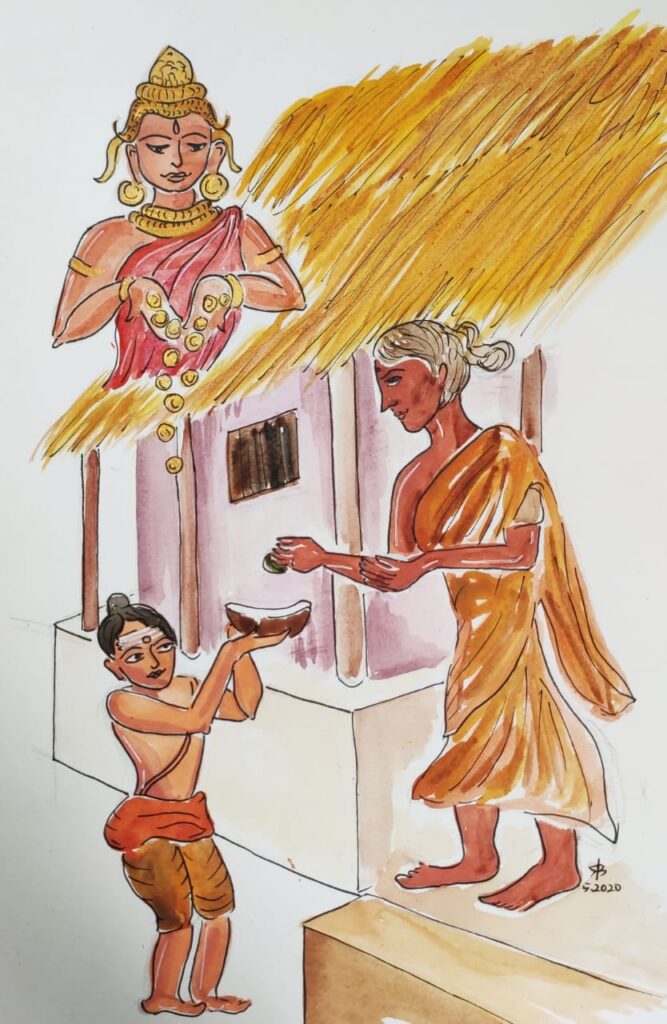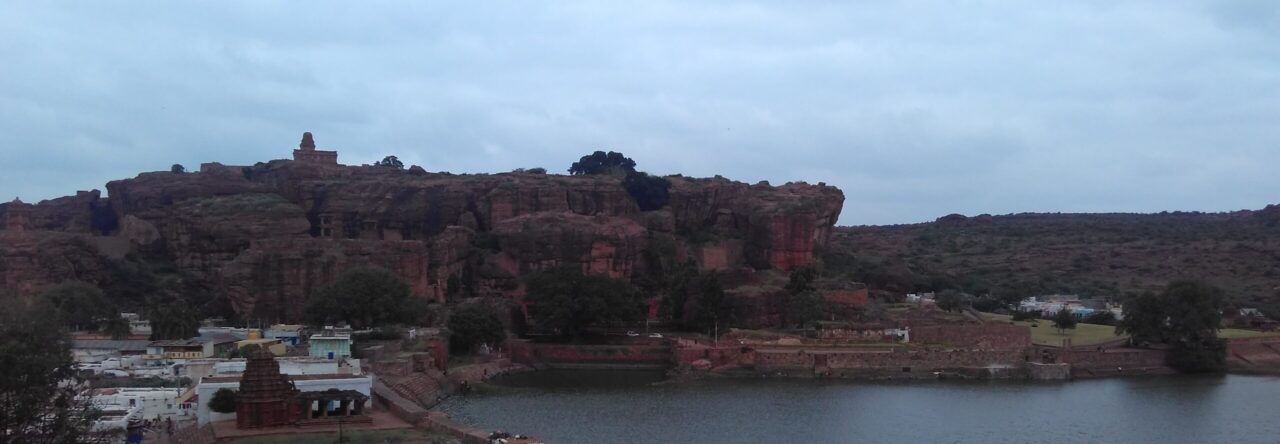
Today is Adi Shankara Jayanthi, the birth anniversary of Guru Adi Shankara and as a tribute to the Guru, I am going to narrate the story behind his composition of the Kanakadhara Stotram on Goddess Mahalakshmi. This Stotram or hymn is considered to be very powerful in propitiating Goddess Mahalakshmi, the Goddess of Wealth.
Shankara, who later on became known as Adi Shankara, was born in Kaladi in Kerala in 509 BCE. His parents were Sivaguru and Aryamba and they were blessed by Lord Shiva to have such an excellent child who was the epitome of intelligence and divinity.
After his father passed away when he was four years of age, Shankara started his studies at a Gurukul. It was the practice in ancient India for the students in a Gurukul to go and seek alms every day from strangers for their food. They would bring back what was collected and share it with the other students and the teacher and eat. They would have to go far and wide for this purpose. This practice of seeking alms from strangers brought in the attitude of humility in the students, since they had to give up their ego while begging for food.
Shankara, one day, as usual went for collecting alms and went to a hut. He stood in front of the hut when he saw that there was a lady there. He said in a melodious voice “Bhavati Biksham Dehi!” which translates into “Mother, give me alms!”
The lady was wearing tattered clothes and had a pale and haggard appearance. She was apparently very poor. However, Shankara did not choose to move away, since anyway, after calling out three times, if there was no response, the practice was to move away and go to the next place. The lady noticed Shankara and acknowledged his presence with a smile. Then she seemed to be frantically searching for something.
The fact was, that she was terribly poverty-stricken and there was not a grain in the house. But the virtue of hospitality was so abundant in India in those days and now also to a certain extent, that one deemed it a privilege to feed strangers and wholeheartedly served strangers with the best of what they had.
Such being the case, this lady was frantically searching in her hut inside the pots and pans for some rice and dal, but alas! There was none. Her face wore a worried look. Here, there was this young innocent child who was face shone with intelligence,waiting at the doorstep for food. . He was looking like the Sun God in the form of a child.
The lady felt she had to give him something. It was the day of Dwadashi (twelfth day from waning or waxing of moon) and generally people who observed the Ekadashi fast would break the fast on Dwadashi by consuming a gooseberry fruit (amla). She remembered that there was a gooseberry left and searched on the upper shelf in the kitchen and found the one which she had kept for herself. The fruit had dried up and was in the size of a pea.
She took that and brought it with great trepidation to Shankara, who was waiting outside. She was not sure whether a dried gooseberry could be given as alms, or whether Shankara would even accept the same. With great hesitation she came to Shankara and placed it in his begging bowl. She could not control her tears and told him that it was the only thing available in her house which she could offer him and requested him earnestly to accept this offering.
Shankara was moved by the woman’s selflessness. Here was a woman who did not have anything for herself but unhesitatingly gave away the only thing she had, so as to not send back Shankara empty- handed. This feeling in him poured out as a beautiful Hymn in praise of Goddess Lakshmi. In this spontaneous outburst, he prayed and pleaded with the Goddess of Wealth Devi Mahalakshmi to cast her grace on this poor lady. The words of the hymn which contains twenty one stanzas were very lyrical and divine.
Goddess Mahalakshmi was moved by the beautiful hymn of the little Shankara (who was all of five years old then), and appeared in the skies, and suddenly, there was a downpour of gooseberry fruits made of gold on the hut of the poor lady, who was taken by surprise and could not believe her eyes. But it was true. It just rained and rained of golden gooseberries.
This hymn which Shankara sang, came to be known as Kanakadhara Stotram (Kanaka – Gold; Dhara – continuous pour).
The lady’s hut where this happened in the village Punnorkode came to be known as ‘Swarnathu Mana’ (Gold House). Punnorkode is in Ernakulam district of Kerala.
It is pertinent to mention that in as recent as 2001, the land where the house stood was acquired from the previous owners, and a beautiful Mahalakshmi temple has been constructed in the very same place where the incident happened. This temple was consecrated in 2018.
This is the story behind the Kanakadhara Stotram.
Adi Shankara lived for a very brief period of thirty-two years on this earth and has authored innumerable sacred hymns and texts.
I shall come back with the full story of Adi Shankara sometime later.

Mangala
Super Vidhya.You can compile ur blogs and publish as a book
krvidhyaa
Thank you Mangala!!
Ramakrishnan TCR
very great
doing a great service by helping all to learn about our tradition, virtues and values
krvidhyaa
Thank you very much Sir, for your compliment!
seshambal
Thank you. I do know the story before. Your narration is just beautiful.
krvidhyaa
Thank you very much Madam! Glad that you like my narration!
S Chalapathi Srinivasan
Simple and effective narration Vidhyaa. You are leaving a indelible mark on our glorious heritage by bringing all smaller and lesser known facts.
I am proud of you. Dharmo rakshati rashitiah.
krvidhyaa
Thank you very much Srini! Thanks for taking time and reading.
Bhuvana
Super Vidhya. Bhavana excellent. Good job !
Best wishes to both of you .
krvidhyaa
Thank you Bhuvana!!
Sugandhi Raja
I fully appreciate the steadfastness with which you do your( real) storytelling with the goal of helping others, child and or adult to understand the vast and rich cultural heritage of Bharath from the Vedic period onwards. Keep it up Vidya. I am so proud of you!
krvidhyaa
Thank you so much Sugandhi ji for your words of encouragement! Am overwhelmed!
Lalithambal Natarajan
A known story narrated very well inducing to read it again excellent illustration by Bhavna…keep it on
The temple is news to me Will try to visit
krvidhyaa
Thank you Akka!
Rema Balagangadharan
You are doing a great job by narrating these old forgotten stories and thereby imparting the Hindu (indian)values and virtues which most people don’t know about. Thank you. God bless you.
krvidhyaa
Thank you Rema ji for you compliments!
Geeta Ramanujam
Absolutely well written and illustrated. We need this. Thank you Vidhyaa.
krvidhyaa
Thank you so much Madam!! Thanks for taking time to read.
R. Latha
👏👏👏👏
krvidhyaa
Thank you Latha!
Balasubramanian K.S
Are you aware that during Karkitakam Kanakadhara Mahalakshmi temple organises Ramayana Saptaham and also conduct Ganapathy Homam Sreesooktha Pooja on all Tuesdays & Friday’s of Adi month?
krvidhyaa
No Sir! I am not aware. Now I know through your message. Thank you!
R Srinivas
It gives great pleasure to read the narrative as happened in those historical times when Sri Aadi Sankara, who, no doubt, the incarnation of the real Sankara Himself. Each and every hindu soul should be proud to know about the illustrious achievements of Sr Aadi Sankara, for the upliftment of everyone. His selfless efforts to enlighten each and every soul on this sacred land of Bharath was astounding, and that too with in a very short period of 32 years of his life. But the Almighty is not time bound because That itself is the Time, which still guides everyone through thick and thin.
I do thank you right from my heart for your beautiful presentation of the story behind the creation of the Kanakadhara Stotram by the Saint Aadi Sankara. Well done and keep going.
krvidhyaa
Thank you very much Srinivas Ji! Thank you for your feedback.
gargi aggarwal
thanks a lot for sharing and enlightening all of us. God bless you.
krvidhyaa
Thank you Gargi ji!!
jigar a pathak
What a story! Can you please give the background to Bhavaani Ashtakam? Thank You…
krvidhyaa
Thank you Pathak ji!
Shivashankar Rajiv
A learning experience, told simply and couched in devotion, and replete with knowledge and dedication.
This is a gift from you to the generations to come, teaching them how to get the grace of Devi.
krvidhyaa
Thank you Shivashankar ji!
Viswanathan M
I had the opportunity to visit the Swarnathu Mana before the construction of the Mahalakshmi Temple there. Now l would like to visit the temple Thanks for the info.
krvidhyaa
Thank you ji!
Pamela Narayan
What a lovely narration ! Thank you for sharing 🙏🏼
krvidhyaa
Thank you Ji!
Satish
Beautifully narrated. Thank you for sharing this Vidhyaa ma’am 🙏
krvidhyaa
Thank you Sathish ji!
Sowmya
very nice vidhya,I want more stories for my kids
krvidhyaa
Thank you Sowmya! There are so many I have narrated and you can narrate the same to your kids!!
Gomathi S
Beautifully narrated Vidhya with a very nice drawing also.
krvidhyaa
Thanks Goma!
BHUVANESWARI
KADAI TERINDALUM, NEENGAL ARPUDHAMAGA VILAKAMAGA SOLLIIRUKINGA.
ARPUTHAM. NERA PARPADU POLA IRUNTHADU. IDU KATHAILLA UNMAI NIGALVU.
krvidhyaa
Thank you Bhuvaneswari ji!